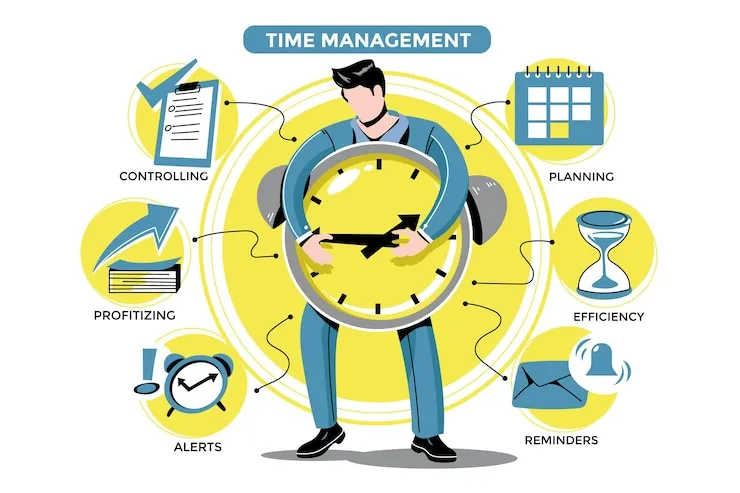Table of Contents
ToggleIntroduction
How to Become a Topper :Ever gazed upon a class topper and asked yourself, “How do they do it?” Well, spoiler alert: they’re not from outer space. They’re just students like you and me—except they’ve figured out the secret. The good news? So can you. With the right attitude, clever strategies, and a little bit of grit, becoming a topper is completely within reach.
et’s crush a myth right from the start: Toppers aren’t born, they’re created. They just manage their time better, remain consistent, and understand what works. Ready to get started with the 15 tips and tricks that can land you at the top of your class? Let’s get rolling!
Tip 1: Set Clear, Achievable Goals
Having set clear and attainable goals is the foundation of achievement. It’s not enough to hope for good grades or success, but to have a clear map to work with. Without goals, you could feel lost or overwhelmed even when you work at it hard enough. Goal-setting can be likened to planning for a road trip: without a destination, you won’t be able to know when you’ve reached it. The same goes for your academic or personal goals.
Why Clear Goals Are Important
A goal is not a wish; it’s an incredible force that propels you into action. Once you set a clear goal, your mind begins to work towards it. For example, instead of stating, “I wish to perform well in my exams,” state, “I wish to obtain over 90% in my next exams.” This change provides your mind with a definite goal to work towards, and you can then dissect the steps you need to take in order to attain that.
The more distinct the goal, the more purposeful and persistent your actions will be. Having a clear goal makes you work consistently towards it, which can make all the difference.

Break Your Goal Down
After you have a long-term goal, break it down into smaller, more manageable tasks. Just as eating an entire pizza in one bite is too much, attempting to accomplish a big goal all at once can be overwhelming. But by breaking it down, it is easier to swallow.
For instance, if your goal is to score 90% in your exams, break it down into daily and weekly tasks:
- Read a particular chapter every day.
- Solve a group of practice problems nightly.
- Review old material on weekends.
This division makes an overwhelming objective manageable steps, and every little victory keeps you encouraged.
Set SMART Goals
A good method of ensuring your goals are definite and obtainable is by applying the SMART model:
- Specific: The goal must be well-defined. Instead of saying, “I want to improve at Math,” say, “I want to solve 20 Math problems every day.”
- Measurable: Monitor your progress. For instance, rather than “I want to improve my grades,” say, “I want to get 85% in my next testt.”
- Achievable: Make sure the goal is possible. Shoot high, but within reeach
- Relevant: The goal should matter to you. Passion will fuel your persistence.
- Time-bound: Every goal must have a deadline. Like, “I want to increase my Enlish grades by 10% within the next three months.”
Applying SMART goals helps you clarify your intentions and feel a sense of urgency, which keeps you focused and not prorastinate.
Review and Adjust
Goal-setting is not a one-time taGoal-setting is not a once-and-done process. Periodically check your progress. Ask yourself: “Am I on track? Do I need to change my approach?”sk. Regularly assess your progress. Ask yourself: “Am I on track? Do I need to adjust my approach?
Occasionally, life might need you to make adjustments in your plans. You may have to modify study timetables, change resources, or alter your strategy based on your progress. Flexibility is the name of the game—don’t be discouraged if things don’t work out as planned. Success lies in learning and adapting in the process.
Celebrate Milestones
Don’t ignore your successes, however tiny. From finishing a task to achieving a mini-objective, ensure you celebrate. This energizes your morale, keeps you inspired, and reminds you of the success you’re accomplishing. Rewarding milestones makes the process enjoyable, rendering goal-setting an empowering one.
Tip 2: Develop a Customized Study Plan
A customized study plan is the key to academic achievement, and it must be designed to meet your individual needs, energy levels, and lifestyle.
One Size Doesn’t Fit All
Your study plan must be in sync with your natural rhythms. Some people are morning people, while others are night owls. Plan your schedule according to when you are most alert and foccused.
Weekly and Daily Planning
Begin with a weekly schedule to organize subjects and activities. Divide your weekly schedule into daily objectives, concentrating on one subject at a time. Schedule time blocks for each activity to ensure you remain focused and avoid distractions.

Be Practical Regarding Time
Don’t pack your agenda. Set realistic targets according to available time. Try out how much time tasks require and adjust your plans accordingly. Don’t forget to add time buffers for time lags.
Add Breaks and Downtime
Take regular breaks in order to remain focused. Employ strategies such as the Pomodoro technique (25 minutes of study, followed by a 5-minute break) to remain refreshed. Don’t forget exercise, nutritious meals, and sleep for overall health.
Adjust the Plan
Life is volatile, so remain adptable. If something interrupts your routine, fix it and compensate for lost time afterward. Update your plan from time to time to fine-tune and enhance it.
Balance Study and Activities
A balanced life is the secret to long-term success. Make time for relaxation, leisure activities, and socializing to prevent burnout.
In short, a tailored study plan should be flexible, realistic, and aligned with your energy and priorities. It will keep you on track and productive while ensuring a healthy balance in your life.
4o mini
Tip 3: Master Time Management
- Time management is all about making conscious decisions about how you allocate your time to optimize productivity and reduce stress..
- It assists you in remaining concentrated on key tasks with some space for relaxation and rest.
Tips for Mastering Time Management:
Reful your mind and body to keep yourself productive.
1 Prioritize Your Tasks:
Apply the Eisenhower Matrix to categorize tasks by urgency and importance.
Do urgent and critical tasks first and prepare ahead for long-term tasks.
2 Create a Daily Schedule:
Employ time-blocking to allocate specific hours for activities.
Establish reasonable time constraints for each tas
3 Steer Clear of Multitasking:
Concentrate on one task at a time to enhance concentration and productivity.
Multitasking can slow down productivity and raise errors.
4 Get Rid of Distractions:
Switch off notifications and employ apps to block distracting websites.
Set up a quiet, concentrated study environment.
5 Master the Art of Saying No:
Say no politely to social invitations or non-essential tasks during peak study hours.
Maintain focus on your academic pursuits and balance work and relaxation.
6 Monitor Your Progress:
Regularly review how well you’re doing at managing your time.
Adjust your schedule if you’re getting behind.
7 Make Time for Rest:
Plan breaks and take sleep seriously to prevent burnout.
Tip 4: Understand, Don’t Memorize
Memorization is a popular mode of study, but it doesn’t always contribute to long-term success. While it can serve for remembering things such as formulas or definitions, mastery actually involves comprehending the material rather than memorizing. Here’s the reason why placing emphasis on comprehending is a better idea:
The Difference Between Understanding and Memorizing
- Memorization is a matter of remembering facts without learning or comprehending them. As an example, you might memorize formulas or dates for an exam, but that doesn’t allow you to understand why they’re important.
- Understanding is an ability to learn the essential ideas and apply them to new situations. It helps you to put the material into your own words and connect it with other information.
Why Understanding is Better Than Memorizing
- Long-Term Retention: Comprehension results in improved long-term retention compared to memorization. When you really comprehend something, it lasts longer.
- Critical Thinking: Comprehension promotes active interaction with the material, allowing you to solve problems and think critically, particularly in areas such as math and science.
- Flexibility: When you comprehend the concepts, you can use them in different situations, as opposed to memorized facts that are more difficult to apply.
- Less Stress: Learning the content decreases cramming, which may decrease stress and pressure during tests.
How to Prioritize Learning Over Memorization
- Divide Up Concepts: Don’t attempt to learn all at once. Learn one concept at a time and ask questions such as, “Why is this significant?” and “How can I utilize this?”
- Teach What You’ve Learned: ve Learned: Explaining the material to someone else, or even to yourself, serves to test your understanding. If you can teach it clearly, you know you’ve mastered it.
- Use Active Learning: Work with the material using questions, discussion, and practice problems rather than reading and memorizing
- Create Connections:Connect new information to what you already know. This serves to reinforce the material and make it more easily recalled
- Use Analogies and Real-Life Examples: Analogies make difficult concepts easy to understand by comparing them to real-life experiences.
- Review and Reflect: Keep going over the material to reinforce your understanding. Practice spaced repetition to solidify your hold on the topic.
- Ask Questions: If it is not clear, ask. Interacting with others can provide fresh perspectives and enrich your understanding.
Tip 5: Make Consistency Your SuperpowerMake Consistency Your Superpower
Success rarely results from burst efforts—it results from consistently showing up every day. Consistency is what turns the ordinary into the exceptional. It’s not about performing something occasionally with high intensity; it’s about performing it regularly, even if you don’t feel like doing it.
The Power of Daily Discipline

You may believe working 10 hours a week is sufficient, but the reality is that daily persistence is much more productive. Working just 2 hours a day creates a habit, conditions your mind, and keeps you continuously improving. By showing up every day, you remain aligned with your goals, and progress comes naturally. Practiced daily, discipline results in mastery over time..
Small Steps, Big Wins
Consider growth as compound interest—small steps taken regularly yield enormous outcomes in the long run. One formula a day doesn’t appear like much, but within a month, that’s 30 formulas under control. One essay a week becomes more than 50 essays yearly.
Don’t wait for the “perfect moment” to accomplish a large task. Take small, consistent steps today. It’s these little, consistent actions that ultimately result in large victories. Success is not in how quickly you move, but in how consistently you progress.
Tip 6: Intelligent Note-Taking Techniques
Cornell Method
Split your page into notes, cues, and summary. It helps to structure thoughts and increase revision speed.
Mind Maps
Vibrant and pictorial, mind maps are an excellent tool to recall subjects that have numerous interconnected ideas.
Tip 7: Use the Right Study Resources
Books, Online Courses, and Beyond
Select good materials. Utilize YouTube judiciously. Apps such as Khan Academy or Coursera can prove to be a turn-around.
Quality Over Quantity
Avoid piling up books. Use 1-2 reliable sources per topic and extract every ounce of value out of them.
Tip 8: Practice Makes Perfect
Solve Past Papers
Toppers don’t only read—they practice. Solvng previous year’s question papers informs you of what to expect.
Take Mock Tests Regularly
Establish exam-like situations. Set the timer. Get accustomed to the pressure. It’s all about training your brain.
Tip 9: Have a Distraction-Free Zone
Digital Detox
Set your phone aside in another room. Utilize website blockers. Focus during study hours.
Setting Boundaries
Inform your friends and family about your time schedule. Respect your time, and they will do so as well.
Tip 10: Sleep Enough
Sleep Is Brain Food
7-8 hours of sleep isn’t a luxury—it’s a necessity. Sleep aids in memory retention and mental clarity.
Ditch the All-Nighters
They may seem cool in
Tip 11: Eat Smart, Stay Fit
Brain-Boosting Foods
Include nuts, fruits, eggs, and leafy greens. Avoid junk. Your body is your study engine—fuel it well.
Don’t Skip Exercise
Even 30 minutes of walking or stretching can improve focus. A healthy body supports a sharp mind.
Tip 12: Stay Motivated and Inspired
Watch Toppers’ Interviews
YouTube is full of real topper stories. Watch what worked for them and borrow what suits you.
Use Vision Boards and Affirmations
Imagine your goal. Tell yourself things like “I’m improving day by day.” Positive affirmations work, believe me.
Tip 13: Don’t Be Afraid of Failure
Learn from Blunders
Did poorly on a test? That’s information, not defeat. Study it. Adjust. Do better.
Fail Forward
Each failure is feedback. Each tumble is a step forward if you learn from it.
Tip 14: Ask for Help When Needed
Mentors Make a Difference
Ask teachers, seniors, or tutors when stuck. Guidance saves time and confusion.
Study Groups and Peer Assistance
Group studies assist in various ways—doubt is removed, and you also think differently.
Tip 15: Trust Yourself
Confidence Instead of Comparison
Don’t compare your chapter 1 to another’s chapter 10. Pay attention to your own improvement.
You vs. You
The only competition to you is yesterday’s you. Better every day, and you will amaze yourself.
Conclusion
Being a topper is not all about being intelligent—it’s about being strategic, consistent, and persistent. Anyone can be a topper if they really want to be one and work for it. Follow these 15 tips as your guide. Do it step by step. Remember, every topper was once where you are today—asking themselves if they could do it. And they did. So ccan you.
FAQs
How many hours should one topper study per day?
There isn’t any fixed number, but generally, most toppers study 4–6 hours regularly with concentrated attention and scheduled breaks.
Can an average student become a topper?
Certainly! It’s not about being born intelligent—it’s about clever planning, discipline, and determination.
What is the best time to study?
Early morning (5 AM – 8 AM) or late night (10 PM – 1 AM) are usually the quietest times. Choose what best fits your tempo.
How do toppers deal with distractions?
They organize study timetables, put phones on silent mode, and set up special places for studying where there are few interruptions.
Do toppers possess some special talent?
Not really. What they possess is a sy
- Why Every Man Needs a White T-Shirt
- Understanding the Basics
- Fits and Styles of White T-Shirts (Enlarged)
- Picking the Right Fabric
- Sizing Guide
- Style Tips for White T-Shirts
- When and Where to Wear a White T-Shirt
- Price vs. Quality
- Where to Buy White T-Shirts
- Best Brands for Men’s White T-Shirts
- Common Mistakes to Avoid When Buying a White T-Shirt
- 1. Choosing the Wrong Fit for Your Body Type
- 2. Disregarding Fabric Quality
- 3. Being Too Sheer or See-Through
- 4. Not Inspecting the Neckline
- 5. Ignoring Shrinkage
- 6. Selecting the Wrong Length
- 7. Forgetting the Occasion
- 8. Wearing Stained or Yellowed Tees
- 9. Not Trying Before Buying (if offline)
- 10. Overpaying for Branding
- Taking Care of Your White T-Shirts
- Eco-Friendly and Sustainable Options (Explained in Detail)
- FAQs Before Purchasing












